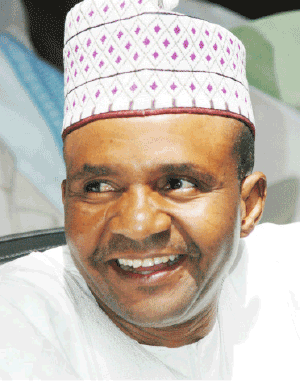Assistant Editor (North), CHUKS EHIRIM, who was among journalists that visited Gembu Community in Sardauna Province, Taraba State, recently, presents the report of grave neglect, by Nigeria, of a place with great economic and tourism potentials…
Danbaba Suntai, Taraba State governor.
Have you done a journey of nine hours by road at a stretch, from one part of a state to another? Well, if this is a feat, it was recorded by Nigerian journalists on Saturday, June 13, 2014 when they travelled, for over nine hours, from Jalingo, the capital of Taraba State, to Gembu, headquarters of Sardauna Local Government Area.
The story may not be in the long distance journey but more in the fact that this journey was done in the same, troubled North East geo-political zone (security-wise) by the same journalists who are being blackmailed, by the Nigerian military authorities, of aiding the distribution of weapons, using circulation vans.
For the second time, within two months, the national leadership of the Nigeria Union of Journalists (NUJ) took its National Executive Council (NEC) meeting to the dreaded zone that has earned for itself the unenviable tag of Boko Haram enclave, which many Nigerian leaders fear to visit these days. For many, therefore, the NUJ adventure in this regard amounts to extreme patriotism.
If the journey from Abuja to Jalingo was long and tiring, that between the Taraba State capital and the Sardauna Local Government Council was, simply put, cumbersome. It was undertaken in a long convoy accommodating all national officers, zonal leaders as well as chairmen and secretaries of the NUJ in the 36 states of the federation, including Federal Capital Territory (FCT).
The journey kicked off few minutes after noon, after the opening ceremony of the NEC in Jalingo on Saturday, June 14. The trip was led by a patrol vehicle of the Federal Road Safety Commission (FRSC).
There was stop-over at the Sarti Tourism Camp, located in Barua Town. There, the newshounds had lunch at about 4.30 pm, before proceeding to the ‘high city of Gembu which is approximately 1,830 metres above sea level.
Few kilometres from Sarti, several trucks were sighted waiting to be loaded with Gembu cattle (bulls) which are usually brought down from the mountainous Gembu community. These trailers take the bulls to different parts of the country, especially the South, where they are sold to the final consumers.
It was after Barua that the real journey commenced. Ascending the hills was quite a tedious job. The road from the foot of the hills was in terrible shape. The over 600-kilometre road from Jalingo, this reporter gathered, was actually constructed when Olusegun Obasanjo was the military Head of State of Nigeria. It was only late last year that the Taraba government awarded contract for rehabilitation of the road, which is actually supposed to be a federal project. Though an impressive level of work has been done by the company handling the job, the most dangerous aspect of it – the highly forested part – is yet to be tackled.
So it becomes a herculean task for those who venture into this place, the only route to Gembu, to undertake. The vehicles had to resort to crawling, snail speed you would say. For the occupants of the vehicles, especially the first-timers, the fear of not dropping out of the windows was palpable. With this fear, most of the ‘travellers’ began to draw close to God – perhaps thinking that was their last moments. Trust the Nigerian and his easy recourse to prayers, especially when he finds himself in danger.
In that state of trepidation, the journey, like Mongo Betty’s “Mission to Kala”, continued. The single lane road is not only narrow, but bumpy and stony. At some point, it was as if the vehicle would be rolling back. This, however, did not happen till they arrived the level ground, almost the summit of the hilly community. Here, the weather had become chilly, with snow affecting visibility. At 5pm, the drivers had to use their head lamps, to see through the very cloudy road.
At this point, the beauty of Gembu became manifest. The abundance of natural endowments, plenty of the Christmas trees, spring water, temperate weather condition, the rich farm lands, the fresh fruits such as apples said to have the potential of being grown in commercial quantity, the beautiful grazing lands and the fat bulls (cows) – which someone actually described as mini-elephants, other livestock, the green tea farms, the special beans, the pure natural honey sold along the road, banana and plantain farms, near absence of mosquitos and flies, all combine to make Gembu an envy to any visitor.
Despite all these natural endowments, Gembu still remains a sorry sight; in fact, a study in neglect and deprivation. The place is like one huge enclave for the country’s local imperialists who colonised it for their personal comfort. The community, which is said to have been part of the German colony/territory before the plebiscite of the early 1960s when the inhabitants voted to remain part of Nigeria instead of going with the Cameroun, lacks basic infrastructure.
Apart from the deplorable state of their road, Gembu, headquarters of Sardauna council that was created in 1976, has no electricity: it is not connected to the national grid. Its only source of power supply is said to be a giant generator mounted somewhere by the local government. It is only put to use whenever the government could afford to supply fuel.
Though the place is a potential tourist centre, it lacks any thing that could attract tourists either within or outside Nigeria for now. There are no standard hotels, no recreational facility apart from one decrepit ‘night club’ called Jazzy Kay, which looks like one of the vestiges of the pre-colonial era. It was there that the journalists were treated to a ‘gala nite’ by the amiable local government chairman, Gabriel Daniel.
To make matters worse, the people of Gembu have been stripped of the ownership of their rich farm and grazing lands by those described by Daniel as “absentee land owners”. These are past Nigerian leaders who are said to have acquired large expanses of land there, but have refused to put them to good use. The lands so acquired are lying fallow, even as the teeming population of the community, especially the youths are agitating for space for farming or grazing purposes.
Everywhere in Gembu, the people are complaining. They are complaining of lack of jobs, farming space, and absence of good things of life. Many of them are complaining that they would like to go back to Cameroun since Nigeria has refused to offer them hope.
Apart from agriculture and tourism potential which Gembu has in abundance, the place equally has what it takes to boost the country’s growth in the area of sports. This may have informed the decision, some years ago, by the National Sports Commission (NSC) to establish what looks like sports academy there. However, apparently in the same spirit of neglect, the complex had been abandoned for decades. Standing at its site now are relics of collapsed buildings and sign posts announcing to the visitors that NSC was once there.
Talking about Gembu and sports development, TheNiche was reliably informed that the German sports giant, Puma, had wanted to establish a middle and long distance training camp for primary and secondary school children in Nigeria, with Gembu as the fulcrum, while Kagoro in Kaduna State, Mubi in Adamawa State and Jos in Plateau State, would serve as satellite training camps.
The Puma team, our source revealed, was in Jalingo for nine days, wanting to see then Governor Jolly Nyame. After nine days of waiting, without being able to meet with the governor, the team left with its $100 million sports development project fund. Puma took the project to Mombasa region of Kenya where it trained the children. In the 2012 London Olympics, 39 children who were products of that project were said to have competed on the platform of 21 other countries in the world.
Thus, the journey to Gembu, though an eye-opener, cannot be said to be a thing of celebration, given that one came into the stack reality of how Nigeria has continued to waste her possibilities for true greatness.












